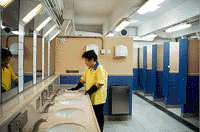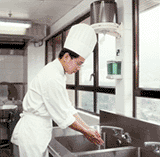A Food Safety Plan should include some basic activities which address hazard control more broadly. Basic activities include: cleaning and sanitation , personal hygiene practices, pest control, waste disposal, staff training and handling of customer complaint.
A. Cleaning and sanitation programme
Effective cleaning and sanitizing remove food residues and dirt and hence minimize the risk of food contamination and food poisoning. A cleaning programme should be developed to ensure that cleaning is conducted in a systematic and regular manner. A well-planned cleaning programme should include the following:

- areas and equipment to be cleaned
- frequency of cleaning required for each item
- the specific standard procedure
- equipment and methods to be used
- chemicals or systems to be used
- the staff responsible for each task
B. Personal hygiene practices
Good personal hygiene is essential for food safety. Disease-causing bacteria may be present on the skin and in the nose of healthy people. All food handlers must therefore maintain a high standard of personal hygiene and cleanliness in order to avoid transferring pathogens to foods.
C. Pest Control
Pest may contaminate food and cause foodborne illness. A pest control programme should be developed to eliminate pests and prevent pests from infesting your food premises. An effective pest control programme should be able to prevent access, deny harbourage and eradicate any pests present.
D. Waste Disposal
Waste can be regarded as any item of food, ingredients, packaging materials, etc. which are not suitable for further use and are intended to be disposed of. Waste should be controlled carefully since it presents a risk of contamination of foods.
E. Staff Training
Training offers food handlers a better understanding of how food can become contaminated, and how foodborne illness can be avoided through proper food handling procedures.
It is a good practice for a business to have a training plan in order to identify the training need for each member of staff, to keep records of the training completed by every member of staff, and to review regularly the role, responsibilities, the existing skills, experience and previous training of the staff.
F. Customer Complaint Record
Customer complaint helps to reflect the problem of the food production process. Complaints should be handled carefully. Appropriate amendment on the Food Safety Plan can be made if necessary.
